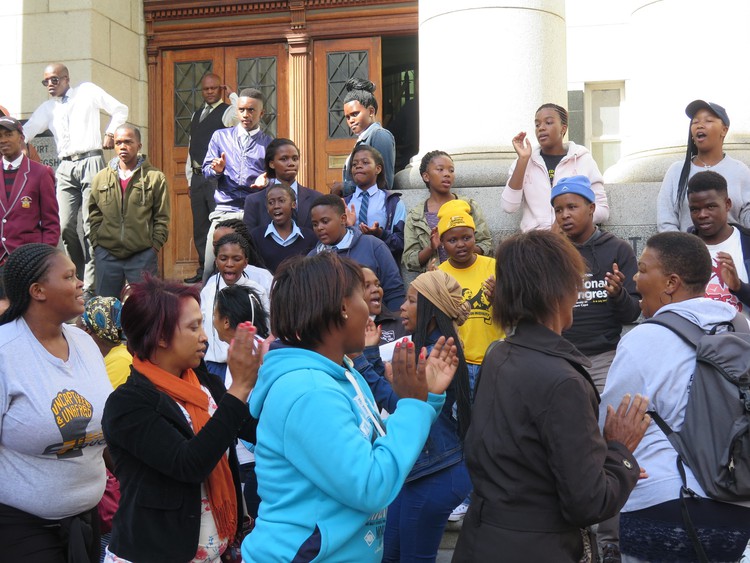
Members of the Grootkraal community and Equal Education supporters demonstrate outside the Western Cape High Court in April. Photo: Ashleigh Furlong
1 August 2017
Judge Elizabeth Baartman reprimanded the Western Cape Department of Education for the “haphazard manner” it has dealt with the proposed eviction of the Grootkraal Primary School and church in Oudtshoorn.
“I am not prepared to consider evicting the Grootkraal learners in the hope that the MEC [Debbie Schafer] will comply with her constitutional obligation to ensure that their right to basic education is not compromised. Thus far it has been,” said Baartman in a written judgment delivered in the Western Cape High Court on Tuesday.
The Grootkraal school has been operating on the land since 1931 and church services were held on the property since the early 1800s. The new owners of the land want to evict the community. The Department of Education has not opposed the eviction.
On Tuesday, Baartman postponed the eviction application for the Department. Before the eviction can take place, the department must first comply with a 2011 court order; it has not yet done so. That court order interdicted the MEC and the head of the Western Cape Education Department from closing down or relocating Grootkraal without proper consultation. The court had also ordered that if Grootkraal was relocated, the new school would need to cater for the health and education needs of learners and staff. Adequate transport also needed to be provided in the event of a relocation.
“Extraordinary as it may seem, the July 2011 order has not been complied with,” said Baartman in her judgment. She said that despite some effort being made by the Department to prepare for the relocation, such as erecting mobile classrooms, it “did not see the need to consult those most affected by the move: parents and children”.
One of the concerns with relocation is that learners will have to wake up very early and travel on difficult roads to access the new school nearly 17 kilometres from Grootkraal. In a summary of proceedings, Baartman said the Department’s response that it was not responsible for the roads “misses the point”. The “Department must not add to the already perilous circumstances that most of the learners have to negotiate to get a basic education,” she said.
She said the Department’s plan beyond the provision of mobile units was a “cause for concern”. Unless the mobile classrooms were modified with heating and cooling systems, they are “unsuitable for the purpose of learning, especially as a permanent solution.”
Baartman also dismissed a counter application that was brought by Lawyers for Human Rights on behalf of the community, which had attempted to have the land declared a servitude (which is when someone has a registered right to use another person’s property).
Baartman said that she understands the request, “given the historical background in which farm workers in general and this community find itself”. She said that much more needed to be done to alleviate the “plight of the rural community, farm workers and children who must be educated to make a meaningful change to the next generation”.
But Baartman said that in this case, if she were to develop the common law in the way that the community wants, “this court would have to forbid an owner who has given permission to” people to use land for “community activities, religious and educational purposes, from withdrawing that permission irrespective of the circumstances”.
She said that the “backlash most certainly will add to the plight of the farmworker in general” and that it would not withstand constitutional scrutiny.
Lawyers for Human Rights plan to appeal Baartman’s dismissal of their counter application.
The matter was postponed until 18 October.